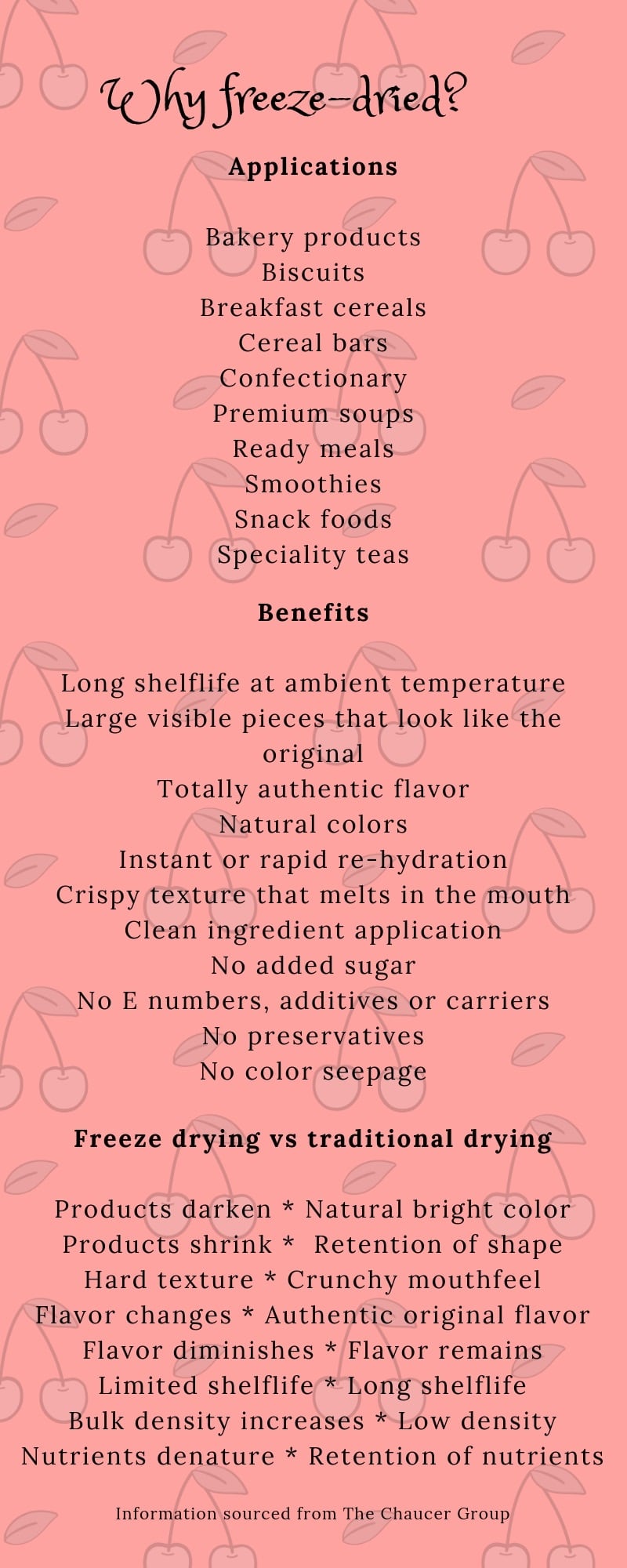Victor Loh, sales director for the APAC region of the UK-based global producer of freeze-dried foods and specialist bread products, Chaucer Food Group, told this site that freeze-dried inclusions are rapidly being recognized as a healthy alternative to more processed ingredients.
“The millennial generation is becoming more concerned about what they eat and how they take care of their health,” said Loh.
Growing interest is also supported by consumer’s growing desire for clean labels.
“With the technology of freeze-dried, we are able to enhance the product: its color and nutrients are all maintained, and shelf life is extended.”
From small beginnings to multinational giant
Chaucer – one of the biggest players in the baked goods and freeze-dried snacks and ingredients sectors – started life as a small family bakery in Kent in 1980, eventually supplying croutons to soup manufacturers around the world.
In 1995, it purchased the Saumur Freeze Drying plant from Unilever and became involved in freeze-drying fruit, vegetables and herbs.
The company picked up the Kellogg Europe account in 1999, followed by the US a year later and “from there, we don’t look back,” said Loh. Today, Chaucer supplies products to an extensive blue chip clientele, including Nestlé, Starbucks and Unilever.
Global market
According to Mordor Intelligence, the global freeze-dried product market was valued at $46.94bn in 2016 and is expected to grow at a CAGR of 7.23% between 2017 and 2022.
Freeze drying – also known as lyophilization or cryodesiccation – is a low temperature dehydration process that involves flash freezing the product, lowering pressure, then removing the ice by sublimation. This is in contrast to dehydration by most conventional methods that evaporate water by using heat.
The expanding food-processing sector and the huge demand for ready-to-eat, convenient food products have considerably increased the demand for freeze-dried products.
Consumers are also becoming more aware of the health benefits of freeze-drying as opposed to other drying methods.

The majority of fruits consist of around 90% of water – the main reason for their spoilage that limits their shelf life and functionality.
Freeze-drying removes almost all the water, making the final products lighter, with a very long shelf life that results in a more accessible and logistics friendly products.
The technology also preserves vitamins, antioxidants and other nutrients, which fruits tend to lose when exposed to high temperatures.
Additionally, as there is no need for preservatives or e-numbers – producers can confidently tag on the clean ingredient label, as no preservatives, E numbers, additives or carriers are used in the process.
The texture of freeze-dried fruits is also crispy and their chips-like form appeals to many consumers.
'Aji-Hitosuji'
In 2016, Chaucer Food Group was acquired by Japan’s Nagatanien Holdings for around $130m.
The Tokyo-based company is considered the leader in instant and freeze-dried Japanese food, and will use the partnership with Chaucer to enter new markets and provide it with access to clean label products.
“From inception Nagatanien’s corporate philosophy has been ‘Aji-Hitosuji’ translating to ‘naturally excellent taste’, and this is perfectly aligned with our own attitude of producing healthy ingredients to meet the growing trend towards healthy eating and nutrition,” Andy Ducker, CEO of Chaucer, said following the announcement.

